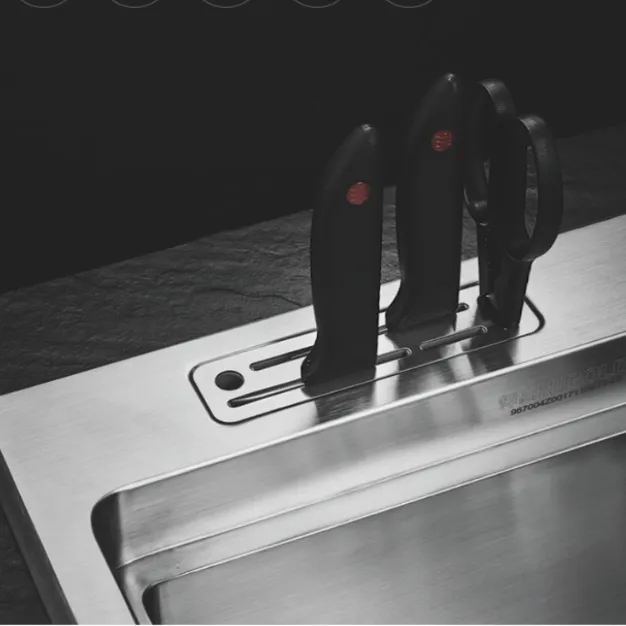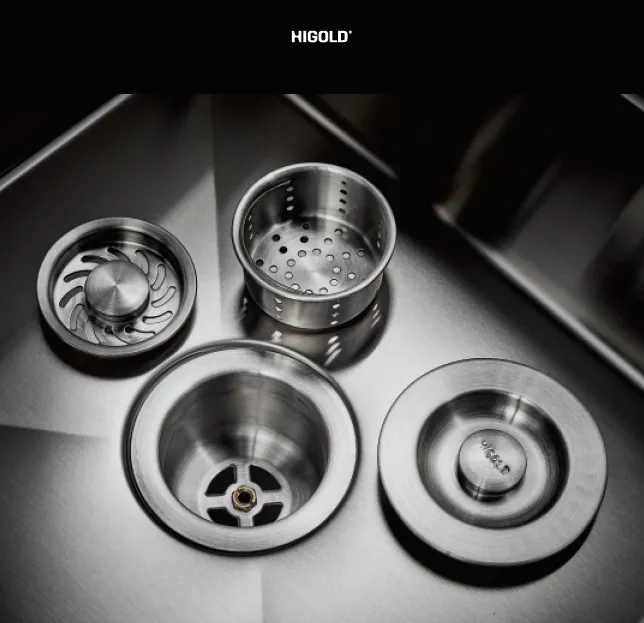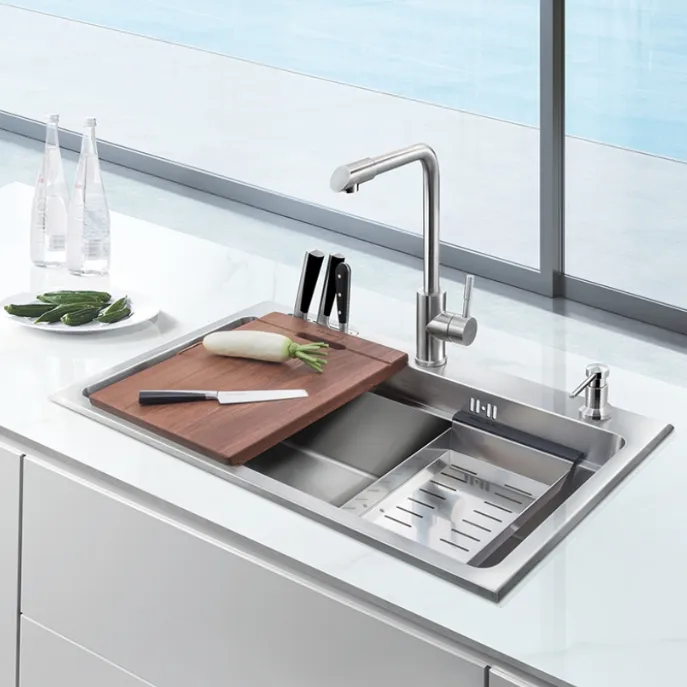As a crucial element, sinks not only impact a kitchen's functionality but also its overall aesthetic. As consumers' demand for quality and personalization in kitchen products continues to rise, handmade sinks have become a popular choice for many high-end kitchen renovations. Their exquisite craftsmanship, unique appearance, and high-quality materials have attracted a large number of tasteful and design-conscious consumers.
So, what exactly is a handmade sink? How does it differ from traditional assembly-line sinks? Why are handmade sinks so popular? This article will delve into these questions and provide a detailed explanation of the definition, manufacturing characteristics, advantages, and disadvantages of handmade kitchen sinks to help consumers better understand this kitchen product.

What is a handmade sink?
A handmade kitchen sink is a sink crafted through manual labor. These sinks are typically meticulously polished, carved, welded, and polished by highly skilled artisans, resulting in each handmade sink possessing unique appearance and structural characteristics. Compared to industrially manufactured sinks, handmade kitchen sinks feature meticulous attention to detail, exquisite craftsmanship, and typically use higher-quality materials. Each sink is individually customized or meticulously handcrafted.
Handmade kitchen sinks can be made from a variety of materials, including stainless steel, copper, stone, and ceramic. The processing techniques used for each material vary, but their common characteristic is that their production cannot be completed on a fully automated production line. Instead, they rely on the craftsman's exquisite skills, extensive experience, and manual labor.

What are the characteristics of handmade sinks?
The craftsmanship of handmade sinks is complex, typically requiring multiple steps, each requiring meticulous care and exquisite skill from the craftsman. Compared to assembly line production, every detail of a handmade sink receives meticulous attention and polish, enhancing the overall quality and aesthetics of the sink.
• Material Selection and Cutting: The first step in creating a handmade kitchen sink is selecting the right material. This choice of material has a crucial impact on the final result. Common materials used for handmade sinks include stainless steel, copper, quartz, and natural stone. The grain, color, and texture of these materials require precise cutting and carving to meet the design requirements. Each piece of material is carefully selected to ensure uniform texture and no noticeable imperfections.
• Hand-welding and assembly: For stainless steel and copper sinks, hand-welding is a critical process. Artisans manually weld the various parts of the sink together. This welding process requires exceptional precision and skill, as the quality of the welds directly impacts the structural stability and aesthetics of the sink. Each weld is polished to a smooth finish to ensure a flawless appearance.
• Carving and polishing: Handmade kitchen sinks often feature carving or polishing techniques to enhance their appearance and feel. For example, hand-carved patterns and patterns, or meticulous surface polishing, can add an artistic and unique touch to the sink. Polishing also removes any roughness from the surface, making it smoother and more pleasant to the touch.
• Polishing: Polishing is an essential step in handmade sinks, especially for stainless steel and copper sinks. Hand-polishing creates a lustrous finish. Polishing not only enhances the sink's visual appeal but also improves its durability, as it makes the polished surface less susceptible to limescale and stains.
• Personalized customization: Handmade kitchen sinks also have a high degree of personalized customization. Consumers can choose different sizes, shapes, colors and materials according to their own needs and kitchen design. Craftsmen can make unique sinks according to customer requirements to meet the functional and aesthetic needs of different families.

What are the advantages and disadvantages of handmade sinks?
Although handmade sinks have many advantages, they also have certain disadvantages. The following are the main advantages and disadvantages of handmade sinks:
1. Advantages of handmade sinks
(1) Uniqueness and personalization:
The biggest feature of handmade kitchen sinks is their uniqueness. Each sink is carefully crafted by hand and has the characteristics of being unreplicable. If you want to have a unique sink in your kitchen, a handmade sink is undoubtedly the best choice. Whether it is size, shape or carving pattern, handmade sinks can be customized according to personal needs.
(2) High quality and exquisite craftsmanship:
The materials used in handmade sinks are usually of high quality. Whether it is corrosion-resistant stainless steel or high-end natural stone, each sink is carefully selected. Due to the exquisite craftsmanship, every detail of the sink has been given full attention, there are fewer defects in the production process, and the service life is long.
(3) Artistic and beautiful:
Due to the uniqueness of the handmade craftsmanship, handmade kitchen sinks often have a strong artistic sense. The fine carving, grinding and polishing process makes the appearance of the sink very beautiful and can enhance the style of the entire kitchen. For those consumers who pursue kitchen aesthetics, handmade sinks are undoubtedly a very suitable choice.
(4) Strong durability:
Handmade sinks are usually made of high-end materials and undergo rigorous production processes. Their durability is often better than sinks produced on assembly lines. Whether in terms of withstanding heavy impact or corrosion resistance, handmade sinks usually provide stronger protection.
2. Disadvantages of handmade sinks
(1) High price:
Since handmade kitchen sinks require a lot of labor costs and each sink is custom-made, their prices are often high. Compared with ordinary industrially produced sinks, the price of handmade sinks is usually several times or even dozens of times more expensive.
(2) Long production cycle:
Handmade sinks usually require a long production cycle. From material selection to processing, welding, carving, grinding, polishing, etc., each step requires craftsmen to spend a lot of time and energy. Therefore, the delivery time of handmade sinks is relatively long, and consumers need to have enough patience to wait.
(3) High maintenance cost:
Although handmade kitchen sinks are of good quality, due to the special nature of their materials and craftsmanship, the subsequent maintenance costs may be high. For example, copper sinks may need regular maintenance to prevent oxidation, and stone sinks may need to be protected from scratches and bumps. Compared with ordinary stainless steel sinks, handmade sinks require more attention to maintenance.

What are the applicable scenarios for handmade sinks?
Handmade kitchen sinks are suitable for many high-end kitchen decoration and customization needs due to their uniqueness and personalized design. The following are some applicable scenarios:
• High-end kitchen decoration: For those families who pursue high-quality life and pay attention to kitchen design, handmade kitchen sinks are undoubtedly an ideal choice. Its unique craftsmanship and beautiful appearance can enhance the overall grade of the kitchen and bring a unique visual experience.
• Personalized Kitchen Design: For consumers seeking a unique kitchen with a distinctive design, handmade sinks perfectly meet their individual needs. Whether in shape, color, or material, handmade sinks can be customized to meet your design requirements.
• Kitchens that Value Functionality and Aesthetics: For families who prioritize both functionality and aesthetics, handmade kitchen sinks are an ideal choice. Their exquisite craftsmanship not only enhances the sink's durability but also adds a decorative touch to the kitchen design.
How big is Higold's production capability?
Higold owns multiple production bases, including the Star Headquarters Base, Hexagon Building Base, and Unicorn Base, making it the largest smart manufacturing cluster for home hardware in Asia. With over 2,000 employees and cutting-edge automation, our factory supplies millions of sinks each year.
Buyers seeking bulk purchasing, wholesale quotes, or brand partnerships can rely on Higold as their trusted supplier in China with stable production and competitive prices.


